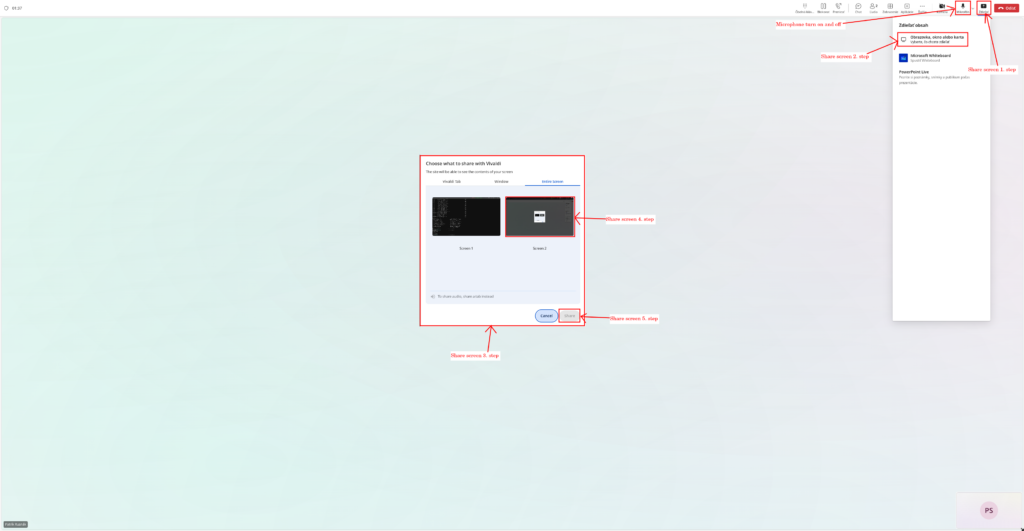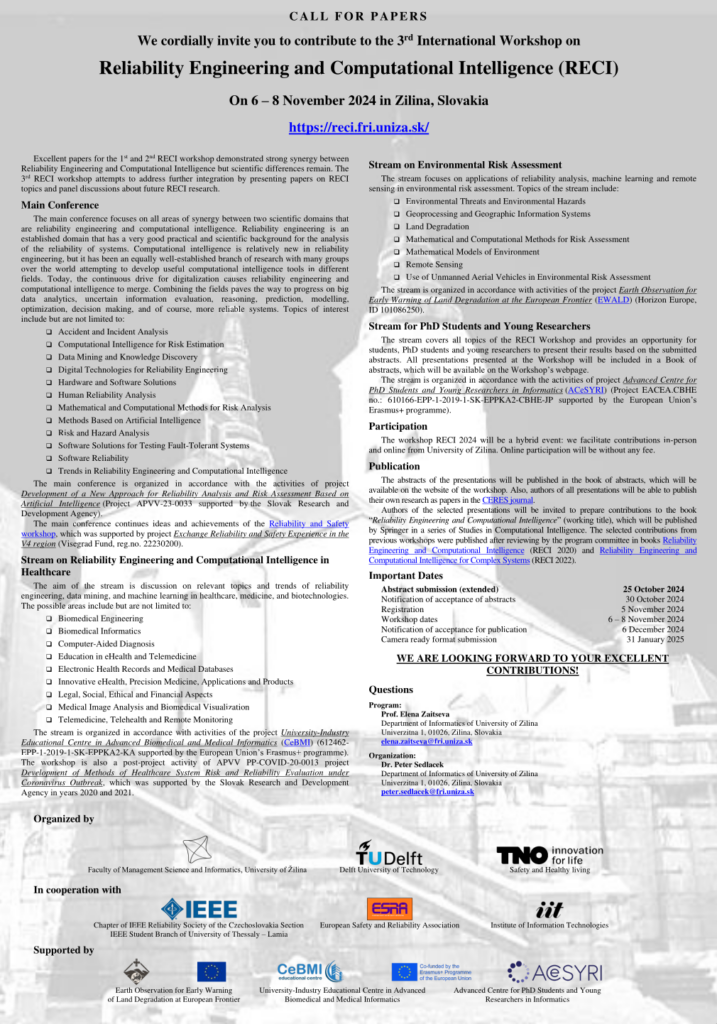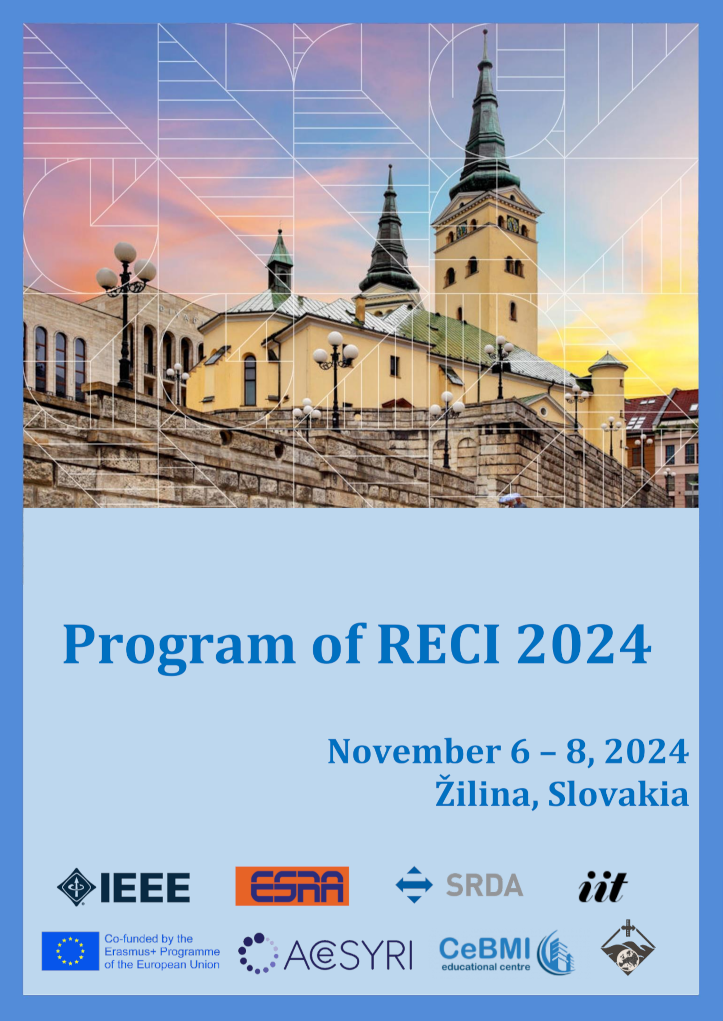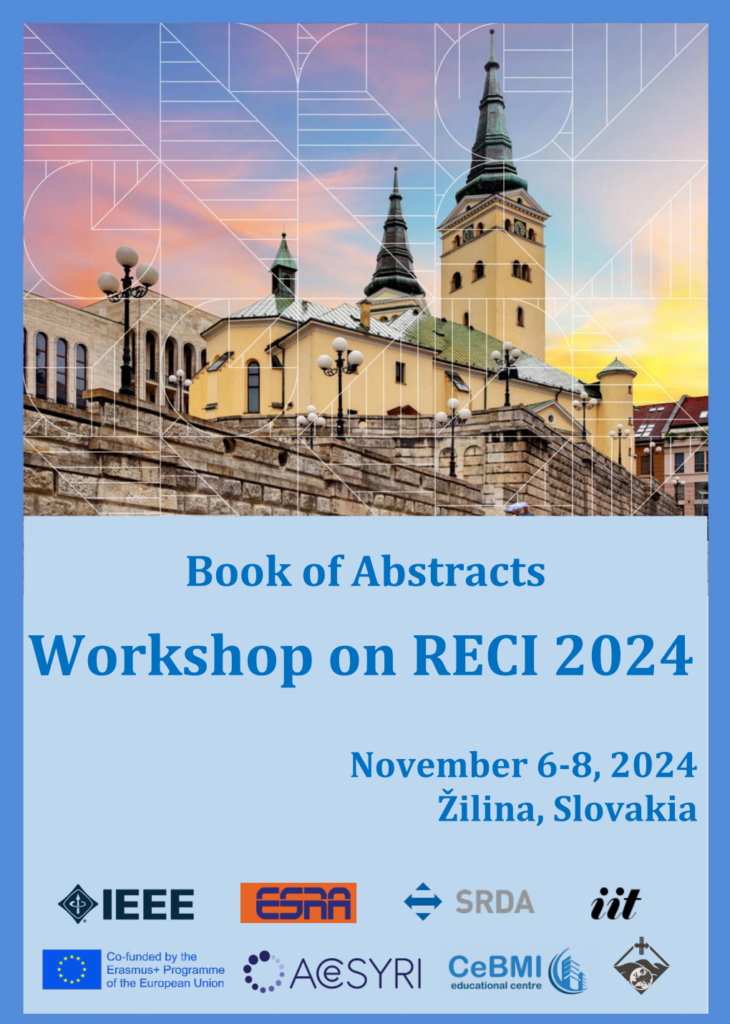The Third International Workshop on Reliability Engineering and Computational Intelligence (RECI 2024)
6 – 8 November 2024, Zilina, Slovakia
Excellent papers for the 1st RECI workshop and 2nd RECI workshop demonstrated strong synergy between Reliability Engineering and Computational Intelligence but scientific differences remain. The third RECI workshop attempts to address further integration by a) presenting papers on RECI topics, b) panel discussions about future RECI research and c) a curriculum discussion for an international RECI curriculum. Since reliability engineering and computational intelligence include a wide range of scientific and engineering areas, the workshop will be divided into three parts:
- Main Conference
- Stream on Applications of Reliability Engineering and Computational Intelligence in Healthcare
- Stream on Environmental Risk Assessment
- Stream for PhD Students and Young Researchers
Main Conference
The main conference focuses on all areas of synergy between two scientific domains that are reliability engineering and computational intelligence. Reliability engineering is an established domain that has a very good practical and scientific background for the analysis of the reliability of systems. Computational intelligence is relatively new in reliability engineering. But it has been an equally well-established branch of research with many groups over the world attempting to develop useful computational intelligence tools in different fields. Today, the continuous drive for digitalization causes reliability engineering and computational intelligence to merge. Combining the fields paves the way to progress on big data analytics, uncertain information evaluation, reasoning, prediction, modeling, optimization, decision making, and of course, more reliable systems. Topics of interest include but are not limited to:
- Accident and Incident Analysis
- Computational Intelligence for Risk Estimation
- Data Mining and Knowledge Discovery
- Digital Technologies for Reliability Engineering
- Hardware and Software Solutions
- Human Reliability Analysis
- Mathematical and Computational Methods for Risk Analysis
- Methods Based on Artificial Intelligence
- Risk and Hazard Analysis
- Software Solutions for Testing Fault-Tolerant Systems
- Software Reliability
- Trends in Reliability Engineering and Computational Intelligence
The main conference of the workshop is organized in accordance with the activities of project Development of a New Approach for Reliability Analysis and Risk Assessment Based on Artificial Intelligence (Project APVV-23-0033 supported by the Slovak Research and Development Agency).
The workshop RECI 2024 continues ideas and achievements of the Reliability and Safety workshop (https://idt.fri.uniza.sk/index.php?clanok=workshop_RT), which was supported by project “Exchange Reliability and Safety Experience in the V4 region” (Visegrad fund, reg.no. 22230200).
The HEALTH-2 section of the workshop is organized in line with the activities of the project ‘Biomedical Signal Classification Using Fuzzy Classifiers’ (EU NextGenerationEU: Recovery and Resilience Plan for Slovakia, project No. 09I03-03-V04-00416).
Stream on Reliability Engineering and Computational Intelligence in Healthcare
The aim of the stream is discussion on relevant topics and trends of reliability engineering, data mining, and machine learning in healthcare, medicine, and biotechnologies. The possible areas include but are not limited to:
- Biomedical Engineering
- Biomedical Informatics
- Computer-Aided Diagnosis
- Education in eHealth and Telemedicine
- Electronic Health Records and Medical Databases
- Innovative eHealth, Precision Medicine, Applications and Products
- Legal, Social, Ethical and Financial Aspects
- Medical Image Analysis and Biomedical Visualization
- Telemedicine, Telehealth and Remote Monitoring
The stream is organized in accordance with activities of the project University-Industry Educational Centre in Advanced Biomedical and Medical Informatics (612462-EPP-1-2019-1-SK-EPPKA2-KA supported by the European Union’s Erasmus+ programme). The workshop is also a post-project activity of APVV PP-COVID-20-0013 project Development of Methods of Healthcare System Risk and Reliability Evaluation under Coronavirus Outbreak, which was supported by the Slovak Research and Development Agency in years 2020 and 2021.
Stream on Environmental Risk Assessment
The stream focuses on applications of reliability analysis, machine learning and remote sensing in environmental risk assessment. Topics of the stream include:
- Environmental Threats and Environmental Hazards
- Geoprocessing and Geographic Information Systems
- Land Degradation
- Mathematical and Computational Methods for Risk Assessment
- Mathematical Models of Environment
- Remote Sensing
- Use of Unmanned Aerial Vehicles in Environmental Risk Assessment
- ArcGIS Application in Environmental Risk Assessment;
- Cartography and maps development
- Risk Assessment in Environment
The stream is organized in accordance with activities of the project Earth Observation for Early Warning of Land Degradation at the European Frontier (EWALD) (Horizon Europe, ID 101086250).
Stream for PhD Students and Young Researchers
The stream covers all topics of the RECI Workshop and provides an opportunity for students, PhD students and young researchers to present their results based on the submitted abstracts. All presentations presented at the Workshop will be included in a Book of abstracts, which will be available on the Workshop’s webpage.
The stream is organized in accordance with the activities of projects Advanced Centre for PhD Students and Young Researchers in Informatics (ACeSYRI) (Project EACEA.CBHE no.: 610166-EPP-1-2019-1-SK-EPPKA2-CBHE-JP supported by the European Union’s Erasmus+ programme).
Participation
The workshop RECI 2024 will be a hybrid event: we facilitate contributions in-person and online from University of Zilina. Online participation will be without any fee.
The presentation title, authors, their affiliations, and abstract should be sent through the conference system. Link to the system will be available soon. The abstract template (.docx format) can be downloaded here.
Publication
The abstracts of the presentations will be published in the book of abstracts, which will be available on the website of the workshop. Also, authors of all presentations will be able to publish their own research as papers in the journal CERES.
Abstracts can be uploaded using this link.
Authors of the selected presentations will be invited to prepare contributions to the book “Reliability Engineering and Computational Intelligence” (working title), which will be published by Springer in a series of Studies in Computational Intelligence. The selected contributions from previous workshops were published after reviewing by the program committee in books Reliability Engineering and Computational Intelligence (RECI 2020) and Reliability Engineering and Computational Intelligence for Complex Systems (RECI 2022).
Important Dates
| Abstract submission | 25 October 2024 |
| Notification of acceptance of abstracts | 30 October 2024 |
| Registration | 5 November 2024 |
| Workshop dates | 6 – 8 November 2024 |
| Notification of acceptance for publication | 6 December 2024 |
| Camera ready format submission | 31 January 2025 |
Simple tutorial for screen sharing in presentation

Program Committee
General Chair
- Luca Podofillini, Paul Scherrer Institut, Switzerland
Steering Committee
- Pieter van Gelder, Delft University of Technology, Netherlands
- Coen van Gulijk, TNO, Netherlands
- Miroslav Kvassay, University of Zilina, Slovakia
- Elena Zaitseva, University of Zilina, Slovakia
Members
- Piero Baraldi, Polytechnic University of Milan, Italy
- Nikos Bardis, Hellenic Army Academy, Greece
- Christophe Berenguer, Grenoble Institute of Technology, France
- Igor Bolvashenkov, Technical University of Munich, Germany
- Emanuele Borgonovo, Bocconi University, Italy
- Stefan Bracke, University of Wuppertal, Germany
- Nicolae Brinzei, University of Lorraine, France
- Radim Bris, VSB – Technical University of Ostrava, Czechia
- Aleksander Cariow, West Pomeranian University of Technology, Poland
- Marko Cepin, University of Ljubljana, Slovenia
- Frank Coolen, Durham University, United Kingdom
- Stanislaw Czapp, Gdansk University of Technology, Poland
- Darya Filatova, RDS Nancy, France
- Petr Fišer, Czech Technical University in Prague, Czechia
- Tetiana Hovorushchenko, Khmelnytskyi National University, Ukraine
- Hassan Ibouh, Faculty of Sciences and Technologies, Cadi Ayyad University,, Marrakesh, Morocco
- Ivan Izonin, Lviv Polytechnic National University, Ukraine
- Jörg Kammermann, Technical University of Munich, Germany
- Vyacheslav Kharchenko, National Aerospace University KhAI, Ukraine
- Krzysztof Kołowrocki, Gdynia Maritime University, Poland
- Jozef Kostolny, University of Zilina, Slovakia
- Andriy Kovalenko, Kharkiv National University of Radio Electronics, Ukraine
- Viacheslav Kovtun, Vinnytsia National Technical University, Ukraine
- Emil Krsak, University of Zilina, Slovakia
- Michal Kvet, University of Zilina, Slovakia
- Vitaly Levashenko, University of Zilina, Slovakia
- Gregory Levitin, Southwest Jiaotong University, China
- Nikolaos Limnios, Université de Technologie de Compiègne, France
- Anatoly Lisnianski, Sami Shamoon College of Engineering Bialik, Israel
- Martin Lukac, Hiroshima City University, Japan
- Andriy Luntovskyy, BA Dresden University of Cooperative Education, Germany
- Jaroslav Majernik, Pavol Jozef Safarik University in Kosice, Slovakia
- Jacek Malinowski, Systems Research Institute, Polish Academy of Sciences, Poland
- Igor Melnyk, National Technical University of Ukraine “Igor Sikorsky Kyiv Polytechnic Institute”, Ukraine
- Daoud Mezzane, Faculty of Sciences and Technologies, Cadi Ayyad University, Marrakech, Morocco
- Claudio Moraga, Technical University of Dortmund, Germany
- Ravil Mukhamediev, Satbayev University (KazNRTU), Kazakhstan
- Mirko Navara, Czech Technical University in Prague, Czechia
- Valerie Novitzka, Technical University of Košice, Slovakia
- Jan Rabcan, University of Zilina, Slovakia
- Ludmila Sidorenko, Nicolae Testemitanu State University of Medicine and Pharmacy, Chisinau, Republic of Moldova
- Sergey Stankevich, Scientific Centre for Aerospace Research of the Earth, Ukraine
- Bernd Steinbach, Freiberg University, Germany
- Sergey Subbotin, Zaporizhzhya National Technical University, Ukraine
- Janos Sztrik, University of Debrecen, Hungary
- Min Xie, City University of Hong Kong, Hong Kong
- Sergiy Yakovlev, Lodz University of Technology, Poland
- Enrico Zio, European Foundation for New Energy-Electricité de France at Ecole Centrale Paris and Supelec, France, Politecnico di Milano, Italy
Organizing Committee
- Chair: Peter Sedlacek, University of Zilina, Slovakia
- Michal Mrena, University of Zilina, Slovakia
- Patrik Rusnak, University of Zilina, Slovakia
Keynote Speakers
Prof. Stefan Bracke
University of Wuppertal, Germany
Electromobility transformation: Challenges for reliability engineering
Abstract:
Automotive power train engineering is in a state of upheaval. Within the European Union, the proportion of registered vehicles with electric drives is increasing exponentially, while the proportion of vehicles with conventional drives based on combustion engine technology is falling steadily. This transformation brings with it enormous challenges for the technical reliability of the electric drive with regard to the product life cycle against the backdrop of the circular economy. The focus here is particularly on the traction battery, as it is a function- and safety-critical system and at the same time has a high value-added share in the electric vehicle.
Therefore, on the one hand, the long-term reliability and maintainability of traction batteries must be ensured as part of the first life. On the other hand, strategies must be provided for 2nd life use in order to ensure a high degree of saving resources. In principle, there are two ways of saving resources: Reuse (or further use) of components and recycling of materials.
Here, reliability engineering plays a special role with regard to battery systems: aspects of degradation behavior, dismantlability, maintainability, testing of the condition of cells/submodules/modules, prognosis of the Remaining Useful Life (RUL) as well as safety tests are of essential importance.
The presentation focuses on the challenges of the technical reliability of traction batteries with regard to the product life cycle in multiple use against the background of the circular economy in the electromobility transformation phase.
CV:
Univ.-Prof. Dr.-Ing. Stefan Bracke studied mechanical engineering at the University of Bochum and received his doctorate in the field of quality assurance within product recycling. After working at Porsche AG (Stuttgart, Germany) and the Technical University of Cologne, Germany, he has been Professor of Reliability Engineering and Risk Analytics at the University of Wuppertal since 2010. Furthermore, he accepted a guest professorship at Meiji University in Tokyo, Japan, in 2016. The focus of his research and teaching is on reliability and risk analytics in the development (reliability models and accelerated testing), manufacture and field use (proven in use) of technical complex products, apparatus and plant engineering.
Gregory Levitin
Southwest Jiaotong University, China
Defending Complex Systems Against Intentional Attacks and Natural Impacts
Abstract:
The presentation aims to explore various methods aimed at safeguarding systems from both intentional and natural impacts.
It discusses analysis of defense and attack strategies, examining how these strategies interact and influence each other. Central to the discussion is the methodology used to estimate and mitigate damage inflicted upon systems. This methodology draws upon a blend of risk analysis, game theory, and the theory of multi-state systems. By integrating these theoretical frameworks, the presentation proposes effective strategies for minimizing vulnerabilities and discusses their practical application in real-world scenarios.
Throughout the presentation, concrete examples are provided to illustrate key concepts and demonstrate how these theoretical frameworks can be translated into actionable strategies.
CV:
Prof. Gregory Levitin received the BS and MS degrees in Electrical Engineering from Kharkov Polytechnic Institute (Ukraine) in 1982, the BS degree in Mathematics from Kharkov State University in 1986 and PhD degree in Industrial Automation from Moscow Research Institute of Metalworking Machines in 1989. From 1982 to 1990 he worked as software engineer and researcher in the field of industrial automation. From 1991 to 1993 he worked at the Technion (Israel Institute of Technology) as a postdoctoral fellow at the faculty of Industrial Engineering and Management. Prof. Levitin is presently a senior expert at the Reliability Department of NOGA-Israel Independent System Operator and distinguished visiting professor at Southwest Jiaotong University. His current interests are in system reliability. In this field Prof. Levitin has published more than 390 papers and five books. He served as a chair of the ESRA Technical Committee on System Reliability, as associate editor of IEEE Transactions on Reliability, area coordinator of International Journal of Performability Engineering. Now he serves as editor of Reliability Engineering & System Safety, and member of editorial boards of several other journals.
Prof. Emanuele Borgonovo, Ph.D. MIT
Bocconi University, Italy
Reliability Importance Measures: from Local to Global
Abstract:
In this seminar, we explore the definition and construction of reliability importance measures. We consider the analysis at the aleatory uncertainty level first and the move to importance measures that address parametric (epistemic) uncertainty. We review several importance measures, starting with the Birnbaum, Fussell-Vesely and closing with global sensitivity indices. We also study a connection between reliability theory and optimal transport. We show how the latter can be used to obtain importance measure that take the entire reliability curve into account.
CV:
Full Professor and Head, Department of Decision Sciences at Bocconi University. He is co-editor-in-chief of the European Journal of Operational Research, advisor of the Springer International Series in Management Science and Operations Research, Co-Chair of the Committee on Uncertainty Analysis of the European Safety and Reliability Association, and member of the Scientific Committee of the Fondazione Silvio Tronchetti Provera. He has been the 2020-2022 President of the Decision Analysis Society of INFORMS. At Bocconi University he has been Director of the Bachelor in Economics, Management, and Computer Science from 2016-2022 and of the ELEUSI Research Centre from 2013 to 2016. He has received several national and international awards.
He holds a Ph.D. in Probabilistic Risk Assessment from MIT, has worked in several international research cooperations, and is the recipient of several national and international awards. He has published over 100 papers in scientific international journals among which Journal of the Royal Statistical Society Series B, Management Science, Operations Research, European journal of Operational Research, Risk Analysis, Statistics and Computing, SIAM-ASA Journal on Uncertainty Quantification, Nature Climate Change, Nature Communications, etc.. His research interests concerns Reliability Analysis, Sensitivity Analysis, Decision Analysis, Risk Analysis, and Uncertainty Quantification. In his works, he has introduced several methods. Among them, the differential importance measure has been introduced in the NASA Probabilistic Risk Assessment Procedures Guide for NASA Managers and Practitioners. He is the author of the book “Sensitivity Analysis: An Introduction for the Management Scientist”, http://www.springer.com/gp/book/9783319522579.
Prof. Paul Barach
Thomas Jefferson University, USA
Imperial College London, School of Medicine, UK
Sigmund Frued University, Vienna, Austria
From High Reliability to Resiliency Engineering – The Future of Patient Safety
Abstract:
Health care institutions continue to face challenges in providing safe patient care in increasingly complex and demanding technical, organizational, and regulatory environments. The keynote will explore the applicability of engineering core concepts of high reliability and microsystems theories to the medical environment. Organizing health care around the pursuit of safety as an overarching priority and a professional obligation for all members of the health care teams. This goal can be accomplished by organizing around and shaping a safety culture focused on reliable performance but requires substantial investments in human capital. Healthcare should be centered around patient concerns and experience, integrated with science and engineering to improve patient diagnosis and outcomes, enhance operational efficiency, and foster sustainable primary healthcare practices/systems. Engineering systems incorporating and stimulating listening are central to any future change in patient outcomes. Both high reliability theory and clinical microsystems provide conceptual and practical frameworks for approaching the delivery of safe care. Although many ambiguities and conflicts arise from the implementation of these theoretic constructs, they should guide the development of work processes and stimulate innovation in fundamental engineering and designed ways to provide safe and effective care within health care systems. Readily accessible communication and information sharing are essential components for creating high reliability. Facilitating the design of systems to identify, prevent, absorb, and mitigate errors can provide remarkable opportunities for improving safety. Measuring reliability can improve the quality and value of our health care systems and quality improvement projects. A highly reliable system has a lower risk of errors and process failures that can cause patient’s harm. Measuring reliability enables us to understand and learn from variability in our systems and discover whether our improvements result in higher reliability. The future of reliable outcomes requires to develop an integrated engineering approach and safety management system capable of navigating diverse engineering challenges to empower patients and healthcare providers with timely access and tailored delivery of critical health information wherever needed.
CV:
Dr. Paul Barach is a professor and clinician scientist who applies tools and methods of implementation and improvement science to better the quality and safety of hospitals and public health programs to strengthen service delivery processes. He is an expert in analyzing and evaluating the implementation of strategic change, especially in global health and care systems. His research work includes the design and application of human factors in undertaking highly responsive, rigorous and rapid appraisals of novel service innovations in health care services. This work provides decision makers and stakeholders with time-critical evidence and learning about
new ways of organizing and providing care. This work has included improving the diagnosis and respiratory health of children in Africa (NIH funded), health of maternal and children in Pakistan (Gates Foundation funded), respiratory health in Bhutan, India, Indonesia, Malaysia, Pakistan, Sri Lanka (UK NIHR funded), nutrition program effectiveness (Global Alliance for Improved Nutrition funded), families and communities in US (HRSA funded), designing interventions for better clinical microsystem and team performance (AHRQ funded), reducing burnout among healthcare providers (EU funded) and assessing long term patients and children with Covid-19 (NIH funded).
Nikolaos Limnios
Université de Technologie de Compiègne, France
Some dynamical systems for reliability modelling and estimation
Abstract:
The aim of this talk is to present dynamical systems evolving in continuous-time and perturbed by Markov processes. We investigate both probabilistic modeling and statistical estimation of such systems. This work was initially developed in order to study cracking problems for the confinement device in nuclear power plants, where a jump Markov process was used as the perturbing process. The new key element here is the use of semi-Markov processes instead of Markov one for the randomization of the system. Numerical illustrations in reliability are investigated.
CV:
Nikolaos Limnios, is Full Professor (Exceptional class) at University of Technology of Compiègne (UTC) Sorbonne University, and former Director of the Laboratoty of Applied Mathematics. He has obtained his diploma in 1979 at AUTh Greece, PhD in 1983, and Dr of Sciences (Doctorat d’Etat) in 1991 at UTC France. In 1988 he was appointed assistant professor (Maitre de conferences), and in 1993 a Professor at UTC in the Laboratoty of Applied Mathematics. His research interest include stochastic processes and statistics with applications in biostatistics, in reliability, statistical seismology, stochastic mechanics, etc.
He is the Editor-in-Chief of book series “Mathematics and Statistics” in iSTE with J. Wiley. He published more than 150 journal papers and about 15 books on theory and applications of stochastic processes and statistics; amount them the books: Semi-Markov chains and hidden semi-Markov Chains toward applications, Springer, 2008 (with V. S. Barbu); Stochastic Systems in Merging Phase Space, World Scientific, 2005 (with V. S. Koroliuk); Semi-Markov Processes and Reliability, Birkhauser, 2001 (with G. Oprisan); Discrete-time semi-Markov random evolutions and their applications, Birkhauser, 2023 (with A. Swishchuk)
Partners
The workshop is organized by University of Žilina in cooperation with TNO, Delft University of Technology and the University of Huddersfield.
Organized by
 |  |  |
| Faculty of Management Science and Informatics University of Žilina | Delft University of Technology |
In cooperation with
 | ||
| Chapter of IEEE Reliability Society of Czechoslovakia Section IEEE Student Branch of University of Thessaly – Lamia | European Safety and Reliability Association | Institute of Information Technologies |
Supported by
 |  |  | ||
| Earth Observation for Early Warning of Land Degradation at European Frontier | University-Industry Educational Centre in Advanced Biomedical and Medical Informatics | Advanced Centre for PhD. Students and Young Researchers in Informatics |


